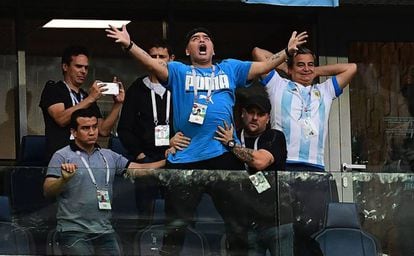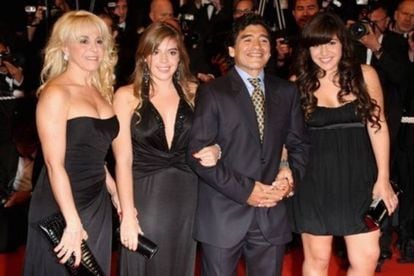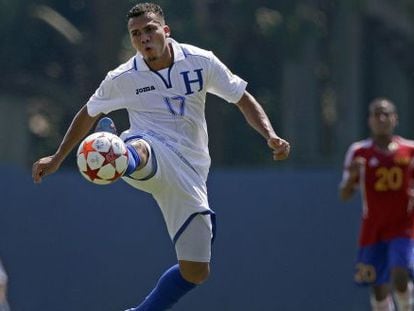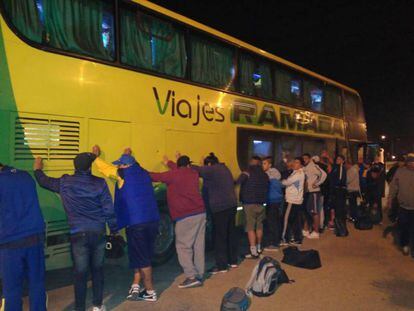Maradona: the overindulgent life of a soccer legend
As his flamboyant antics at the Argentina-Nigeria game show, the ex-player is at a crossroads that could see him undo his sporting legacy as one of the all-time greats


The 58 years that Maradona has lived so far are viewed by some as glorious, and by others as disastrous – but one thing is for sure, no one could ever call them boring. The Argentine soccer player captured the hearts of lovers of the sport in the 1980s and 90s thanks to his excesses, passion and total lack of modesty.
On Tuesday, sat in the VIP area at the Saint Petersburg stadium, where his national side were playing against Nigeria for a place in the World Cup Round of 16, Maradona once again put on quite a show thanks to his gesturing, his swinging from to and fro, and an evident lack of self-control that saw him require medical attention after the game had finished.
Even the sports media, which has always leapt to the soccer legend’s defense, has changed its tune
The many comments bandied around afterwards that pointed to the possible cause of this very public incident are not newsworthy given that they are mere rumor and conjecture, and have not been confirmed. But even the sports media, which has always leapt to the soccer legend’s defense, has changed its tune and has condemned his behavior, in one case stating that “it’s no longer funny and is a pitiful sight.” A sight that, if things carry on like this, could overshadow his image and turn him into a toxic example of exactly what a sportsperson shouldn’t be.
It would seem that Maradona really does believe that he has been touched by “the hand of God” – the nickname that he was given when he scored a crucial goal against England in a quarterfinal match at the 1986 Mexico World Cup with the help of his own hand – and that no one will stop him doing what he wants to. He smoked a cigar in the stadium, even though smoking is banned; he has criticized the Argentina national coach, Sampaoli, because he claims to know more and would do a better job; his attitude and actions steal focus from those who should be the real protagonists of the tournament, i.e. the players themselves; he’s constantly at odds with Pelé, with his women, with his doctors and even some of his children… The life of Maradona, the man who was once a hero for Argentina, is hanging on a thread thanks to his excesses.

The shadow of his addictions still hangs over him. “I was 24 when I took drugs for the first time. In Barcelona,” he once confessed on an Italian TV show. “Drugs are the biggest problem, drugs kill.” Between 1998 and 2000, the years after his retirement from the game, he spoke many times about his desperate fight against cocaine. In January 2000, he was rushed to hospital in Punta del Este, Uruguay, and the doctor who saved his life explained several years later that for 40 minutes, it was touch and go as to whether he would survive.
He traveled to Cuba to go into rehab and he became friends with Fidel Castro. In 2004, he was checked into a psychiatric clinic in Buenos Aires to go through another detox process. In 2005, he claimed to have started to overcome his addiction, and lost 50 of the 120 kilos he weighed at the time thanks to a gastric band.
The life of Maradona, the man who was once a hero for Argentina, is hanging on a thread thanks to his excesses
But in 2007 it was alcohol that saw him back in treatment for a number of weeks. In 2010 FIFA suspended him for two months after, in his role as Argentina manager, he made obscene comments to the press after the team beat Uruguay. “For those who didn’t believe in us, they can suck it and keep on sucking it,” he said on live TV.
In 2011, he was fired as manager of Al Wasl, a club in the United Arab Emirates, after he failed to get results. He returned to the country in 2017, as technical director of another club, Al Fuhairah, for a season.
His love life and legal issues have also given him a bumpy ride. He has five children by four different women, he was investigated for cocaine possession in 1991, he assaulted several journalists in 1994, and he has faced three paternity lawsuits.
In 2006, a woman sued him in Polynesia for having broken a vase over her head after an altercation with his daughter Gianina
And of course there were his problems with the Italian taxman, which demanded he pay more than €34.2 million in unpaid taxes from his time playing with Naples. And also accusations of gender violence and sexual harassment: in 2006, a woman sued him in Polynesia for having broken a vase over her head after an altercation with his daughter Gianina, a case that was settled out of court. In October 2014, his then-partner Rocío Oliva was the protagonist of another altercation, which saw the ex-player shout at her and strike her twice, in an argument over a cellphone. Another lawsuit was filed by the Russian journalist Yekaterina Nodolskaya, who accused Maradona of having tried to take her clothes off when she went to interview him in his room.
Now the Argentine is back at a crossroads, where he can either behave like a capricious and errant idol, or honor his sporting past and preserve the achievements that have made him one of the greatest players in the history of soccer.
English version by Simon Hunter.
More information












































